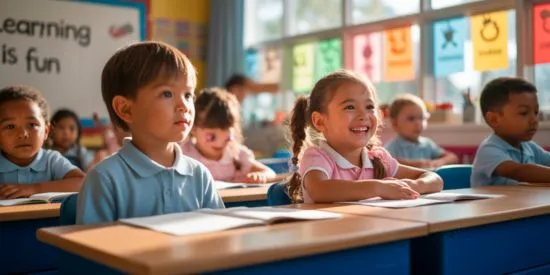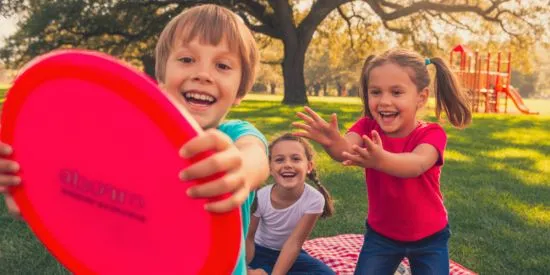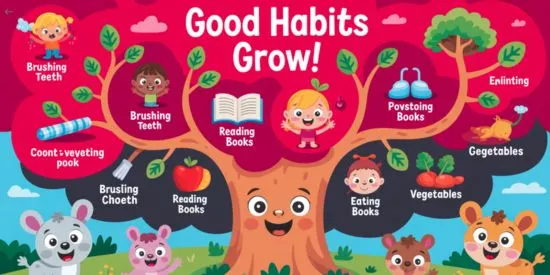Establishing good habits in children represents more than simple routine adherence – it’s about architecting neural pathways that will determine their future success and emotional stability. When parents observe their kids naturally gravitating toward daily activities like washing hands before meals or brushing teeth without reminders, they’re witnessing the profound transformation of conscious actions into automatic behaviors.

- This neuroplasticity window during childhood creates unprecedented opportunities for developing discipline that extends far beyond immediate health concerns. Physical activities, reading habits, and proper hygiene become the foundational pillars upon which confident, responsible adults emerge.
- The importance of consistency over strictness becomes evident when children begin to understand that their daily choices shape their personality and self-esteem. Rather than viewing habit formation as restrictive, kids who develop healthy eating patterns, regular sleep schedules, and clean living spaces discover an inherent sense of control and accomplishment.
- Family time spent encouraging these behaviors transforms individual effort into shared values, where gratitude, honesty, and respect for others naturally flourish. This approach creates children who don’t simply follow rules but internalize the benefits of positive behavior, building confidence through mastery of manageable tasks that prepare them for life’s greater challenges.
Importance Of Good Habits
Strong character development emerges when children consistently practice beneficial behaviors that contribute to their overall well-being and future success. These foundational practices serve as building blocks for academic achievement, social competence, and emotional intelligence that children will rely upon throughout their lives.
Research demonstrates that children who establish positive routines early in life experience greater stability, improved self-regulation, and enhanced ability to navigate challenges with confidence. The long-term impact of cultivating good habits extends beyond immediate benefits, creating a framework for lifelong success in personal and professional relationships.
Children who develop strong habits early demonstrate improved decision-making skills, better time management, and increased resilience when facing difficulties. These essential qualities prepare children for adult responsibilities while fostering independence and self-confidence that support their continued growth and development
Benefits of Developing Good Habits
Practicing gratitude transforms how children perceive their world, motivating them to see beyond immediate desires. When they learn to count their blessings every night before they sleep, something remarkable happens – their perspective shifts from scarcity to abundance.
This simple ritual doesn’t just reduce feelings of entitlement and dissatisfaction; it rewires their neural pathways toward appreciation. The children who embrace this practice naturally develop empathy, compassion, and emotional resilience that extends far beyond childhood. Following structured patterns in daily life creates neurological highways that support executive function development.
A child taught to maintain consistency experiences reduced decision fatigue and increased cognitive capacity for learning. The brain thrives on predictable sequences, and when children internalize routine, they discover an unexpected freedom – mental space previously occupied by constant choices becomes available for creativity and deep thinking. More importantly, these foundational patterns become the scaffolding upon which they build increasingly complex life skills.
How to Develop Good Habits Among Children
Teaching responsibility begins with age-appropriate tasks that children can manage successfully, gradually increasing complexity as they demonstrate competence and confidence. Effective parents understand that developing good habits requires patience, consistency, and clear expectations that align with their child’s developmental stage.
Creating structured environments where children can practice new behaviors repeatedly helps establish patterns that eventually become automatic responses. The process of habit formation thrives when parents combine gentle guidance with natural consequences, allowing children to learn from their choices while feeling supported throughout their growth journey.
Successful parents recognize that each child learns differently, adapting their approach to match their child’s unique personality and learning style. This individualized method ensures that good habits develop naturally rather than through forced compliance, creating lasting behavioral changes that children carry into adulthood.
General Good Habits for Kids
Spending time with friends outside structured environments teaches children social navigation skills that no classroom can replicate. Apart from school interactions, unstructured socialization opportunities allow children to practice conflict resolution, boundary setting, and authentic relationship building. They will also discover how to read social cues, negotiate differences, and develop emotional intelligence through trial and error.
Happiness emerges naturally when children feel genuinely connected to their peer group, creating a foundation for lifelong mental health and relationship satisfaction. Physical habits like maintaining clean and tidy spaces connect directly to cognitive organization.

When children are encouraged to make their beds daily and arrange their belongings systematically, they develop executive function skills that transfer to academic performance. The act of creating order in their physical space mirrors their ability to organize thoughts and prioritize tasks. Cleanliness becomes less about perfection and more about creating environments that support focused thinking and emotional regulation.
Spending Time With Friends
Social connections during childhood establish patterns that influence relationship quality throughout life. Quality friendships make significant contributions to emotional development, teaching children empathy, conflict resolution, and communication skills. These interactions must occur regularly for optimal social growth.
Peer relationships provide learning laboratories where children practice sharing, negotiation, and compromise in low-stakes environments. The development of social skills through friendship is irreplaceable by adult instruction alone. Children learn authentic social cues and develop emotional intelligence through regular peer interaction in various settings.
Thinking Before Making Choices
Critical decision-making skills develop when children understand that every choice has consequences that reach beyond immediate satisfaction. Teaching kids to think before acting helps them become better individuals who can solve problems effectively in various situations.
The process of thinking through decisions builds mental discipline that encourages them to consider multiple perspectives before choosing their actions. Young minds that learn to pause and reflect develop stronger emotional intelligence and better communication skills with people around them. When children practice thinking through their choices, they naturally learn to ask questions, seek new information, and understand different viewpoints.
This skill becomes particularly important during their learning stage when they encounter complex social situations that require thoughtful responses rather than impulsive reactions. Parents who encourage reflective thinking help their children develop lifelong problem-solving abilities that will serve them well in all aspects of life.
Family Time
Family moments serve as the cornerstone where children absorb values through shared experiences, creating lasting memories that shape their character development. During these precious gatherings, parents have unique opportunities to instill positive behaviors while building strong emotional bonds that will guide their little ones throughout life.
When families consistently prioritize quality time together, whether through daily conversations, weekend activities, or simple routines, they create an environment where good habits naturally emerge and flourish. The power of consistent family engagement extends far beyond mere togetherness. It becomes the foundation where children learn essential life skills through observation and participation.
Parents who dedicate time to meaningful interactions with their kids often find that positive behaviors develop organically, as children naturally mirror the values and practices they witness daily. This intentional approach to family time creates a nurturing environment where good habits become second nature rather than forced obligations.
Brushing Teeth Twice Daily
The morning ritual of brushing teeth often becomes a battleground between parents and children, yet this daily practice holds far more significance than merely preventing cavities. When your child begins to understand that their mouth serves as the gateway to overall health, the regular basis of twice-daily cleaning transforms from a chore to self-care.
Getting accustomed to this routine helps establish a foundation where oral hygiene becomes second nature. The ideal approach isn’t just about providing a toothbrush and hoping for the best – it requires ensuring that they understand why their smile deserves this attention.
After waking up, the productive day truly starts when dental care removes overnight bacteria buildup, while the night routine ends with a thorough cleaning before going to bed. This systematic approach prevents tooth decay and maintains optimal oral health, turning what could be a struggle into a kid’s regular habit that will serve them throughout life.
Healthy Breakfast
Nutritionists have long considered breakfast the most important meal, yet many children’s mornings begin with rushed routines that bypass proper nutrition. When we examine comprehensive surveys conducted by the Centers for Disease Control and Prevention in the United States, the effects of improving morning nutrition become clear – enhanced cognitive function and better weight management emerge specifically among adolescents.
The reality is that almost all successful academic performers share one common trait: they ensure their bodies receive maximum energy through nutritious, filling meals that help prevent chronic diseases later in life. Parents must recognize that a child who feels energized at the beginning of each day develops stronger learning patterns than those who skip this mandatory practice.
The easiest approach involves balancing the body’s nutrition needs per individual appetite – some children prefer lighter options while others need substantial meals before heading to school. What matters most is that we set consistent expectations: food consumed during morning hours should provide us with sustained energy rather than quick sugar spikes.
This will naturally encourage children to enjoy tasty yet healthy options, creating a foundation that must be followed throughout their developmental years, keeping mind and body aligned as the internal clock establishes healthy rhythms.
Washing Hands
This simple practice prevents the spread of common cold, flu, and other infections among children, yet many overlook its significance until illness strikes. Before eating food or after playing, children should learn to wash their hands with liquid soap for 20 seconds – the easiest way to prevent illness from taking hold.
Kids naturally tend to touch surfaces all around them, making them more susceptible to colds and various diseases they will encounter in social environments. When we instill these practices early, it encourages children to be mindful of hygiene, which is essential for their overall well-being.
The habit for proper hand hygiene not only protects individual health but also prevents infectious diseases from spreading through entire classrooms or households. Children pick up countless germs as they come across different environments, and without proper washing techniques, they become carriers of illnesses that affect not just themselves but everyone around them.
This will help establish a routine that becomes second nature, making them more aware of cleanliness standards that must be maintained throughout life.
Good Habits in the Classroom
Table manners extend beyond dining etiquette to encompass respect for shared spaces and consideration for others’ comfort. When children learn appropriate behavior around food and social gatherings, they develop awareness of how their actions impact their community.
Basic courtesies taught at home transfer seamlessly to classroom interactions, creating students who naturally consider others’ needs. Not only does this make them more pleasant classmates, but it also develops the social awareness essential for collaborative learning environments.

Walking mindfully through school hallways and classroom transitions demonstrates respect for the learning environment. One simple practice – moving purposefully rather than rushing – gives children more control over their emotional state and helps their classmates maintain focus.
It encourages self-regulation and spatial awareness while contributing to a calm, productive atmosphere. Students who master these movement habits often find they can transition between activities more smoothly and maintain better concentration throughout the day.
Table Manners
When children learn proper dining etiquette, some parents wonder why uncomfortable moments arise during meals. The reality is that teaching boundaries at the dinner table requires patience, as kids must practice repeatedly before mastering these skills. Along with basic politeness, children need to understand that mealtime represents more than just eating.
Rather than viewing etiquette as rigid rules, consider how taught behaviors create social confidence later in life. Children who be comfortable navigating formal dining situations carry with them lifelong advantages. This foundation also extends beyond the family table, influencing and shaping their interactions in restaurants, school cafeterias, and future professional settings.
Walking
Physical movement develops beyond simple locomotion when children understand proper walking habits. During my years observing child development, I’ve noticed how confident walking posture directly correlates with self-assurance in social situations. Children who maintain good walking habits demonstrate better spatial awareness and respect for others in crowded spaces.
The biomechanics of walking correctly establishes foundational health patterns that extend into adolescence and adulthood. When children develop mindful walking practices early, they naturally avoid common posture problems that plague many adults. This seemingly basic habit actually encompasses multiple developmental benefits, including balance, coordination, and environmental awareness.
Following A Routine
Structure creates freedom rather than restriction when children understand that consistency helps them navigate daily challenges. Parents should recognize how routines encompassing morning preparations, homework completion, and bedtime rituals actually increase a child’s ability to handle unexpected situations.
From my experience working with families, children will demonstrate increased confidence when they know what to expect. The psychology behind routine establishment reveals that predictable patterns ranging from wake-up times to evening activities create emotional security.
When children are able to anticipate daily transitions, they develop internal time management skills naturally. All successful routine implementation requires organising daily jobs while maintaining flexibility for unexpected opportunities on weekends or school holidays.
Daily Reading
Cultivating this practice must begin early, as it serves to improve children’s communication skills and expand their vocabulary through visualization techniques that develop naturally over time. It is essential for cognitive growth that children engage with storybooks or anything interesting that develops comprehension abilities among young minds.
When they read regularly, they develop listening skills too – these abilities prove invaluable during later stages of education and social interaction. One of the most scientifically proven benefits offers clear evidence: regularly stimulating a child’s brain development through stimulating areas associated with language processing creates lasting cognitive advantages.
Children who are exposed to new words, characters, ideas, and morals through literature offers numerous benefits such as enhanced imagination and creativity. Reading helps with moral development and problem-solving abilities, as children learn relating techniques through a story’s character development and conflict resolution patterns that mirror real-life situations.
Physical Activities For Kids
Physical engagement transforms children into naturally disciplined beings who understand their bodies’ capabilities. When kids develop regular movement patterns, they learn to appreciate what their bodies can achieve, creating a foundation that helps them stay motivated throughout life. The essence of physical activity, playing games, lies not in structured rules but in encouraging spontaneous movement that teaches children how to handle their energy positively.
Walking becomes more than just locomotion – it’s time for curious minds to observe, process, and develop critical-thinking skills while their bodies work in harmony. Early exposure to movement activities builds a system where children naturally follow routines without external pressure. Young bodies that engage in regular physical activities develop better emotional regulation, as movement helps them understand their feelings and learn to communicate through action.

The key to lifelong physical wellness starts when families make movement a regular part of daily interaction, whether through evening walks or spontaneous dance sessions that promote bonding and teach kids that staying fit should be enjoyable rather than obligatory.
Drinking Water
Water carries required nutrients to all cells throughout our bodies, and most importantly, it helps remove waste products from major organs so they can stay active throughout each day. Children must be encouraged to drink plenty of it, as this will help regulate their body temperature while following the right hydration patterns at the appropriate time.
The habit is very important for those who want to maintain optimal gut health and avoid drinking soft drinks as much as possible. Children who continue this practice later in life demonstrate better physical performance and mental clarity than those who rely on sugary alternatives for hydration.
Proper water intake supports our digestive system and helps them maintain energy levels without the crashes associated with caffeinated or high-sugar beverages. They should learn that water is the most natural and effective way to support their body’s essential functions.
Healthy Eating
Healthy eating habits form when children learn that food choices directly shape their mental abilities and energy levels throughout the day. Teaching kids about nutrition works best when parents set an example by making conscious choices about what goes on their table.
Simple conversations about how different foods help their brain function better encourage children to become active participants in meal planning rather than passive recipients of whatever is served. Management of eating habits requires patience and realistic goals that allow children to learn from their mistakes without feeling restricted.
The morning routine should include time for a proper breakfast that prepares them for learning, while evening meals become opportunities for families to share their day and practice gratitude for the food they have. Kids who understand the connection between nutrition and energy naturally develop better eating patterns that support their growth and help them maintain focus during school activities.
Daily Bathing
Young children tend to view bathing as either pure entertainment or absolute torture, rarely recognizing its essential role in health maintenance. Even after long hours of play, many kids resist the mandatory transition from dirt and sweat to cleanliness, not understanding that exposure to germs and bacteria increases their chances of infection.
The fun element becomes crucial – using soap, shampoo, and toys transforms the bath every day into an enjoyable experience rather than a chore. Parents must ensure their children learn that taking care of delicate skin prevents various problems that can make a child sick. This practice helps them remove accumulated grime while keeping the body refreshed, particularly important during hot, humid weather when comfort becomes paramount.
Teaching cleanliness as a social courtesy also matters – understanding why personal hygiene affects interactions around peers helps children develop awareness of how their habits impact others. The love for bathing grows when children pick up the connection between feeling clean and feeling confident in social settings, making this daily ritual something they need to embrace rather than ignore.
Tips for Parents
Effective parenting involves understanding what motivates children rather than simply demanding compliance. Parents can explain expectations clearly while allowing children to practice new behaviors independently.
The key lies in recognizing how children learn through observation – they naturally mimic adult behaviors more than following verbal instructions. Consistency becomes crucial when establishing any habit, as children should understand that expectations remain the same across different situations. Let children experience natural consequences while maintaining supportive guidance.
Make sure to model the behaviors you want to see, as children are keen observers who notice discrepancies between what adults say and do. These foundational approaches create a framework for long-term success in habit formation.
Conclusion
Character development through consistent habits creates a lasting impact on children’s future success. When families prioritize these foundational practices, children develop intrinsic motivation for personal growth. The compound effect of small daily choices shapes their adult personalities and relationship patterns.
Encourage children to reflect on their progress rather than seeking perfection immediately. Focus on the positive changes they demonstrate, acknowledging their efforts rather than just outcomes. This approach builds resilience and creates children who value growth over performance, setting them up for lifelong development and personal satisfaction.
FAQs (Frequently Asked Questions)
Q: How does maintaining a clean and tidy place help children get ready for school and develop godliness?
When parents wonder about establishing godliness in their children’s daily lives, they must understand that preparation extends beyond simply getting ready for school. The foundation lies in creating environments where children naturally develop reverence through organized spaces.
A clean and tidy place becomes the breeding ground for spiritual awareness, as children learn to respect their surroundings and, consequently, develop inner discipline. This approach teaches them that external order reflects internal harmony, making the transition to school routines smoother while fostering a sense of responsibility for their personal space.
Q: What role does practicing gratitude play in positively shaping a child’s focus and encouraging their efforts?
The practice of being grateful transforms children’s perspective by shifting their focus from what they lack to appreciating abundance in their lives. Rather than waiting until night prayers, parents can encourage recognition of positive moments throughout the day, helping children notice things that contribute to their well-being.
This habit positively impacts their emotional development, as children learn to value the same experiences that might otherwise go unnoticed. By acknowledging efforts of family members, teachers, and friends, children develop empathy and learn to see themselves as part of a larger community of support.




Pingback: Best Kids Lunch Ideas for Parents in 2024